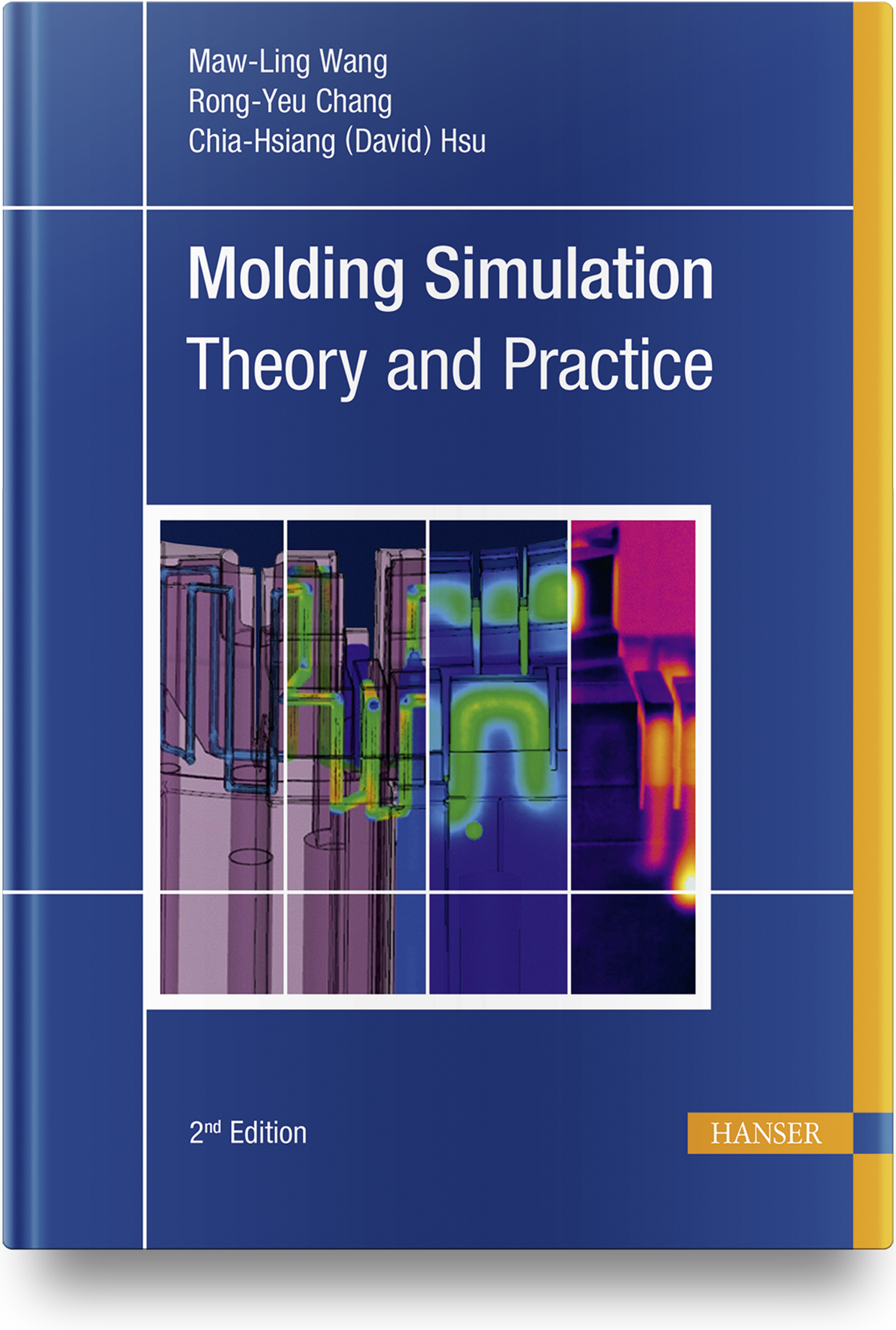Edited by Maw-Ling Wang, Rong-Yeu Chang, Chia-Hsiang (David) Hsu,
Molding Simulation: Theory and Practice
Our checkout for USA and Canada is powered by IndiePubs. You will be automatically redirected to the IndiePubs checkout process.
incl. taxes, plus possibly shipping costs
- ISBN: 978-1-56990-884-6
- Book details: 2. Edition, 06/2022
624 Pages, Hardcover, Full color
The book is conceptually divided into three parts:
Chapters 1–5 introduce the fundamentals of injection molding, and how molding simulation methodology is developed, especially focusing on the effects on molding quality from the rheological, thermodynamic, thermal, mechanical, and kinetic properties of plastics, as well as curing kinetics for thermoset plastics.
Chapters 6–11 introduce CAE verification on injection molding including design guidelines of part, gating, runner, and cooling channel systems. Temperature control in hot runner systems, prediction and control of warpage, and fiber orientation are also discussed.
Chapters 12–17 introduce research and development in innovative molding, illustrating how CAE is applied to advanced molding techniques, including co-/bi-injection molding, gas-/water-assisted injection molding, foam injection molding, powder injection molding, resin transfer molding (RTM), and integrated circuit (IC) packaging.
The 2nd edition contains many updates, including elaboration of material measurement data, connection of Smart Design and Smart Manufacturing, demonstration of the flow-induced fiber orientation effect, implementations of material characterization methods on PU reactive foaming and RTM, studies of dispensing control and creeping behaviors effects on IC underfill process, and much more. Several CAE case study exercises for execution in Moldex3D software are included to allow readers to practice what they have learned and test their understanding.
The book is conceptually divided into three parts:
Chapters 1–5 introduce the fundamentals of injection molding, and how molding simulation methodology is developed, especially focusing on the effects on molding quality from the rheological, thermodynamic, thermal, mechanical, and kinetic properties of plastics, as well as curing kinetics for thermoset plastics.
Chapters 6–11 introduce CAE verification on injection molding including design guidelines of part, gating, runner, and cooling channel systems. Temperature control in hot runner systems, prediction and control of warpage, and fiber orientation are also discussed.
Chapters 12–17 introduce research and development in innovative molding, illustrating how CAE is applied to advanced molding techniques, including co-/bi-injection molding, gas-/water-assisted injection molding, foam injection molding, powder injection molding, resin transfer molding (RTM), and integrated circuit (IC) packaging.
The 2nd edition contains many updates, including elaboration of material measurement data, connection of Smart Design and Smart Manufacturing, demonstration of the flow-induced fiber orientation effect, implementations of material characterization methods on PU reactive foaming and RTM, studies of dispensing control and creeping behaviors effects on IC underfill process, and much more. Several CAE case study exercises for execution in Moldex3D software are included to allow readers to practice what they have learned and test their understanding.
Maw-Ling Wang is a consultant for CoreTech System Co., Ltd. (Moldex 3D) and an Honorary Professor at National Chung Cheng University, Taiwan. From 2003 to 2014 he was Chair Professor, Dean, and Academic Vice President at Hungkuang University, Taiwan. He holds a PhD in Chemical Engineering from Clarkson University, Potsdam, U.S.A. and was previously a consultant at Sachem, Inc., TX.
Rong-Yeu Chang is CEO of CoreTech System Co., Ltd. (Moldex 3D), which he co-founded in 1995. From 1983 to 2015 he was Associate Professor/Professor, Department of Chemical Engineering, National Tsing-Hua University, Taiwan, where he had obtained his PhD. He is a Fellow of the Society of Plastics Engineers.
Chia-Hsiang (David) Hsu is President of Product and co-founder of CoreTech System Co., Ltd. (Moldex3D); previously (1999-2015) he was Director of Research and Development Division/Vice President. He holds a PhD from National Tsing-Hua University, Taiwan.
Maw-Ling Wang is a consultant for CoreTech System Co., Ltd. (Moldex 3D) and an Honorary Professor at National Chung Cheng University, Taiwan. From 2003 to 2014 he was Chair Professor, Dean, and Academic Vice President at Hungkuang University, Taiwan. He holds a PhD in Chemical Engineering from Clarkson University, Potsdam, U.S.A. and was previously a consultant at Sachem, Inc., TX.
Rong-Yeu Chang is CEO of CoreTech System Co., Ltd. (Moldex 3D), which he co-founded in 1995. From 1983 to 2015 he was Associate Professor/Professor, Department of Chemical Engineering, National Tsing-Hua University, Taiwan, where he had obtained his PhD. He is a Fellow of the Society of Plastics Engineers.
Chia-Hsiang (David) Hsu is President of Product and co-founder of CoreTech System Co., Ltd. (Moldex3D); previously (1999-2015) he was Director of Research and Development Division/Vice President. He holds a PhD from National Tsing-Hua University, Taiwan.
"This practical introductory guide to injection molding simulation is aimed at both practicing engineers and students. It will help the reader to innovate and improve part design and molding processes, essential for efficient manufacturing." Technical Gazette, 30, 6(2024)
"This practical introductory guide to injection molding simulation is aimed at both practicing engineers and students. It will help the reader to innovate and improve part design and molding processes, essential for efficient manufacturing." Technical Gazette, 30, 6(2024)


